Editor's note
From June 24th to 28th, CASI successfully held its second capacity-building event on the theme of "Empowering Sustainability and Prosperity in Asia: Innovative Financial Solutions for Connectivity and Transition" in Huzhou, featuring case studies and filed trips to local financial institutions and real economy firms focusing on sustainable businesses. The event was supported by the Huzhou Municipal Government and related organizations, and attracted the participation of representatives from 14 countries and regions.
The event not only shows Huzhou's leading practices in green finance, but also promotes international exchanges and cooperation in green finance and sustainable investment. Through sharing successful experiences and exploring innovative solutions, participants gain a deeper understanding and recognition of promoting sustainable development and green transition. The experience of Huzhou is also regarded as an important demonstration of the construction of sustainable financial markets, providing valuable practical references for countries and regions.
Emerging markets and developing economies are facing significant risks from climate change and biodiversity loss, but have limited access to climate financing, due to reasons including a lack of sustainable financial markets and development capacity for green projects. Building on the success of the inaugural event held in São Paulo, Brazil, the Capacity-building Alliance of Sustainable Investment (CASI) is now launching a new round of capacity building tailored to the Asian environment.
In this context, from June 24th to 28th, CASI successfully held its second capacity-building event on the theme of "Empowering Sustainability and Prosperity in Asia: Innovative Financial Solutions for Connectivity and Transition" in Hong Kong and Huzhou, China. The event included a two-day symposium held in Hong Kong from June 24th to 25th, followed by case sharing and field visits in Huzhou from June 26th to 28th.
The CASI event in Huzhou was co-hosted by CASI and the Huzhou Municipal People's Government. It was organized by the Huzhou Government Office, the Institute of Finance and Sustainability (IFS), and the Huzhou Green Finance Institute (HZGF), with the support of the Huzhou Green Finance Development Center, the Industrial and Commercial Bank of China Huzhou Branch, Huzhou Bank, and Anji Rural Commercial Bank. As one of the first batch of green finance reform and innovation pilot zones in China, Huzhou attracted more than 120 representatives of financial sectors and international organizations from 14 countries and regions, including Malaysia, Thailand, and Mongolia, to discuss the development and cooperation in green finance. Special addresses were delivered at the conference by Li Shangkui, Chairman of the Huzhou Municipal Committee of the Chinese People's Political Consultative Conference, Ma Jun, Chairman of CASI and President of the IFS, Paul Moody, Managing Director, Global Partnerships and Client Solutions, CFA Institute, and Zhang Zhengwei, Special Advisor to the ISSB Chair Emmanuel Faber and ISSB Beijing Office Director.
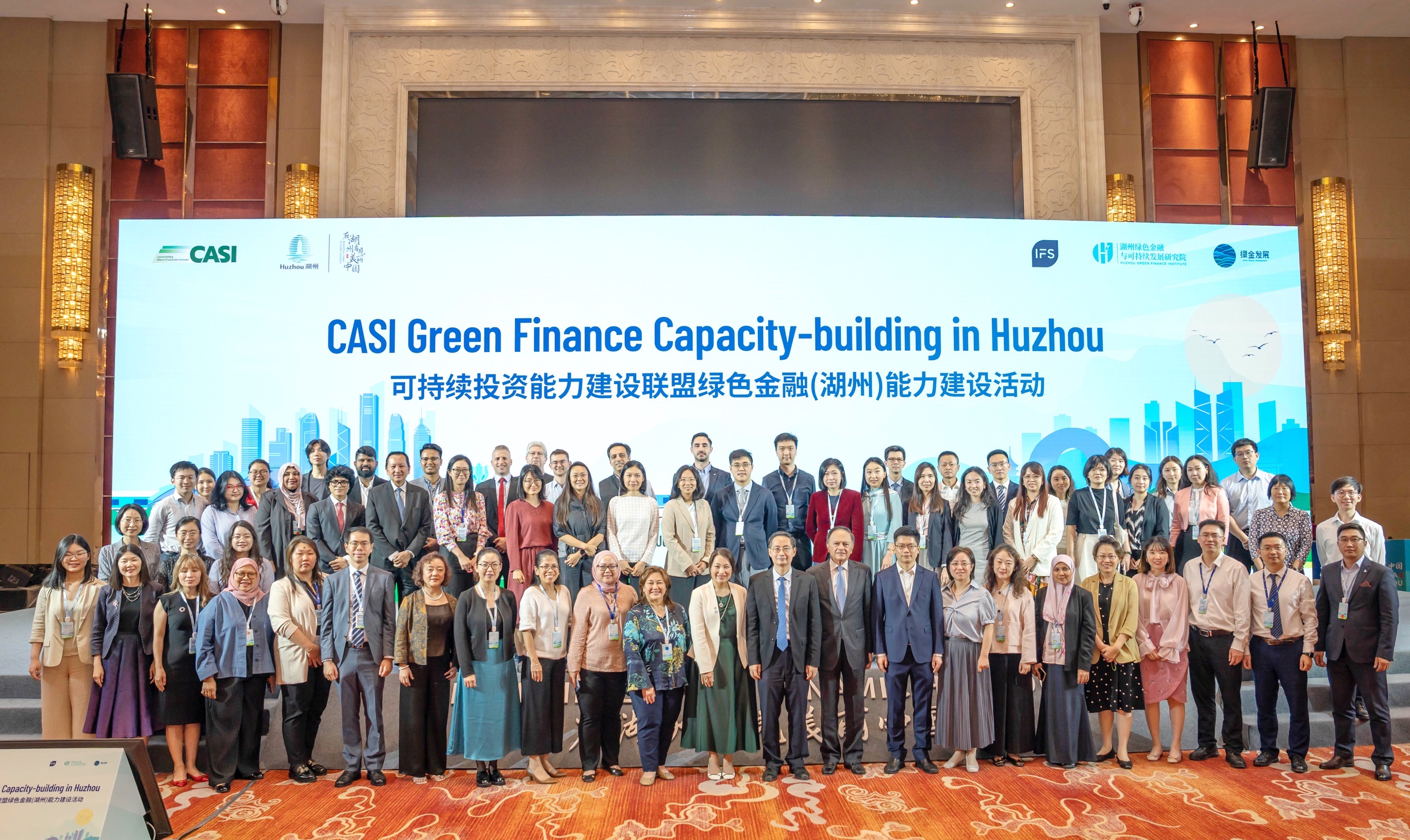
Opening Speech
Li Shangkui provided a comprehensive and detailed introduction to Huzhou City. He began with the phrase " Beautiful China, Dynamic Huzhou," emphasizing the city's natural beauty, profound cultural heritage, and advantageous geographical location. Then, he followed with the thread "Feeling the striving for excellence in Huzhou," outlining the city's achievements in economic growth, industrial cluster construction, and talent attraction. Finally, with the theme of "Turning green into gold in Huzhou," he introduced Huzhou's pioneering explorations and remarkable effects in green finance reform and innovation, including the rapid growth of green loans, the continuous optimization of the financial ecosystem, and the ongoing development of transition finance. He emphasized that CASI plays a significant role in green investment along the "Belt and Road" and global sustainable development, and expected participants to provide more wisdom and references for green finance to support sustainable development.
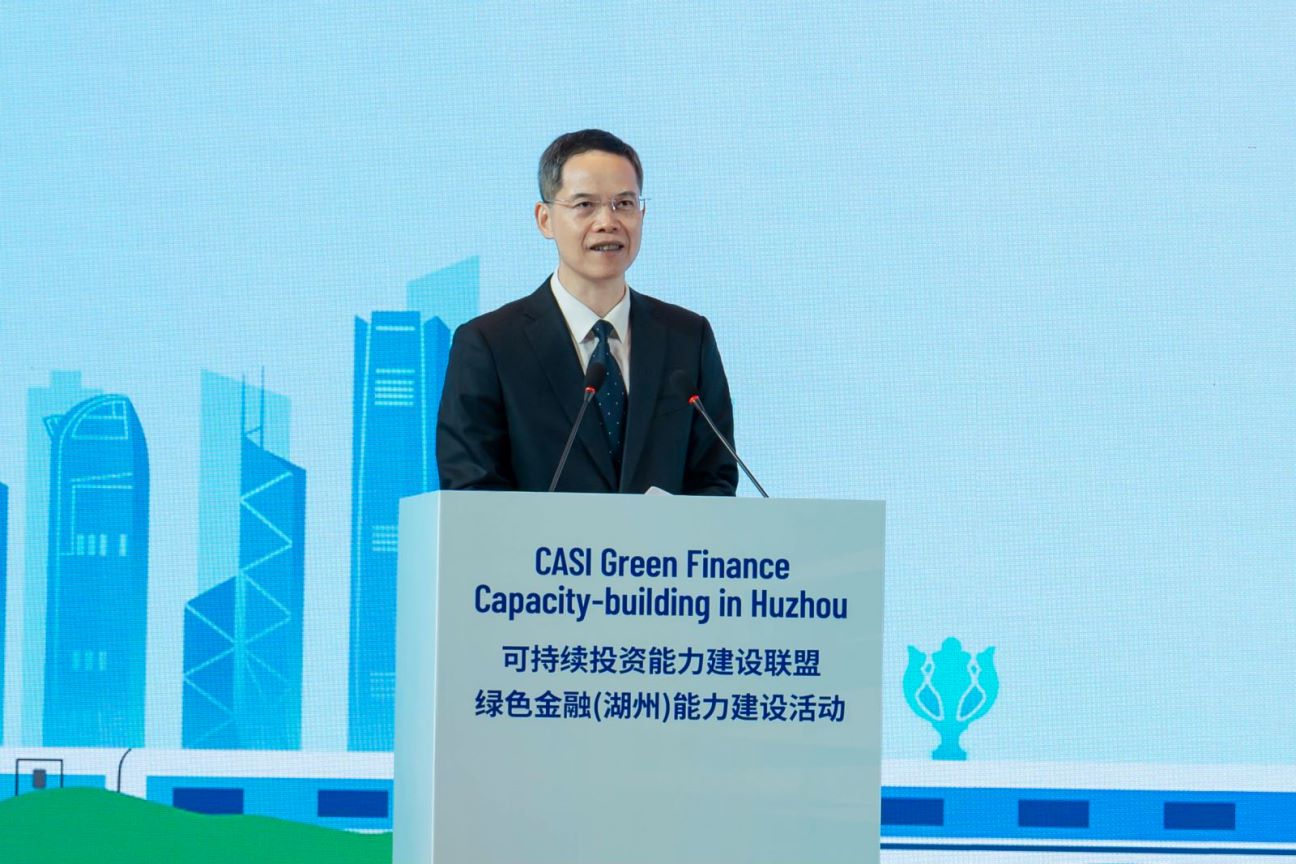
Li Shangkui, Chairman of the Huzhou Municipal Committee of the Chinese People's Political Consultative Conference
Ma Jun reviewed the innovative practices and significant achievements of Huzhou in the field of green finance, and further analyzed the key factors behind Huzhou's success. He mentioned that from 2017 to 2023, Huzhou's green loan annual growth rate reached 45.6%, with green loans accounting for 33.7%, far exceeding the national average, and it has 56 listed green companies, contributing to a significant improvement in environmental quality and a low non-performing loan ratio. Ma Jun summarized five major innovations in the construction of Huzhou's green finance system: first, the establishment of local green finance standards; second, the creation of an efficient platform for green project and funding matching; third, the implementation of diversified green financing incentive mechanisms; fourth, the introduction of hundreds of innovative green financial products, including green loans, green bonds, and green insurance; and fifth, the development of a transition finance framework and the establishment of a public platform for ESG data and carbon accounting, effectively preventing "greenwashing" risks. Ma Jun emphasized that the success of Huzhou's pilot program is due to the high-level government's emphasis, long-term financial investment, and a professional and dedicated team.
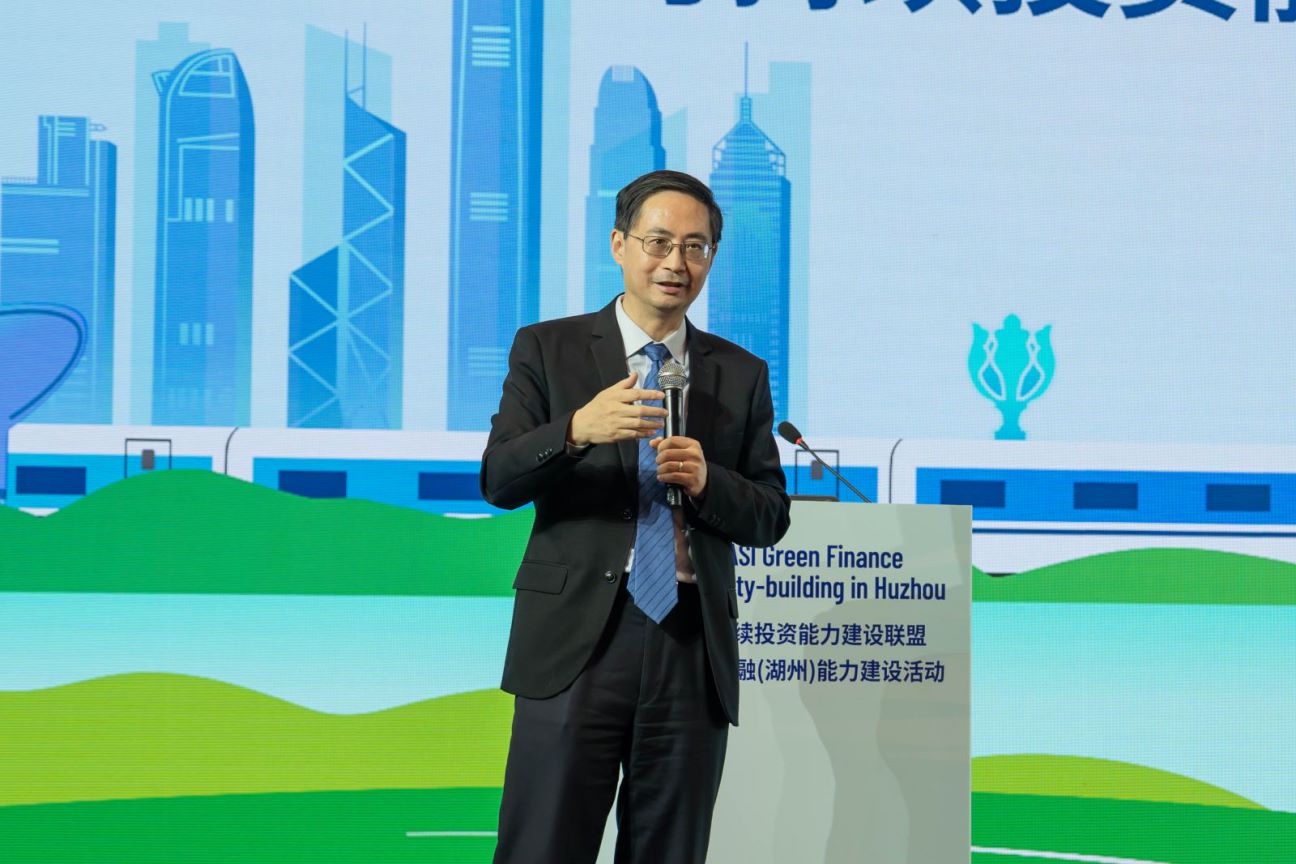
Ma Jun, Chairman of CASI and President of the IFS
Paul Moody stated that as a founding member of CASI, CFA Institute is committed to helping professionals better understand how investments can contribute to sustainable development. He noted that with the increasing global focus on ESG investing, the demand for capacity building in sustainable investment and the improvement of standards is also growing. He commended China's progress in green and sustainable finance, particularly in the large-scale issuance of green bonds and the significant growth in green loan balances. Among these, Huzhou, as a pilot city for green finance reform, has made an outstanding contribution. He emphasized that all parties need to strengthen cooperation to accelerate the development of sustainable investment sector, including upgrading the skills of financial professional in valuing and investing in climate risks, strengthening ESG information disclosure of investment products, and promoting data sharing across institutions.
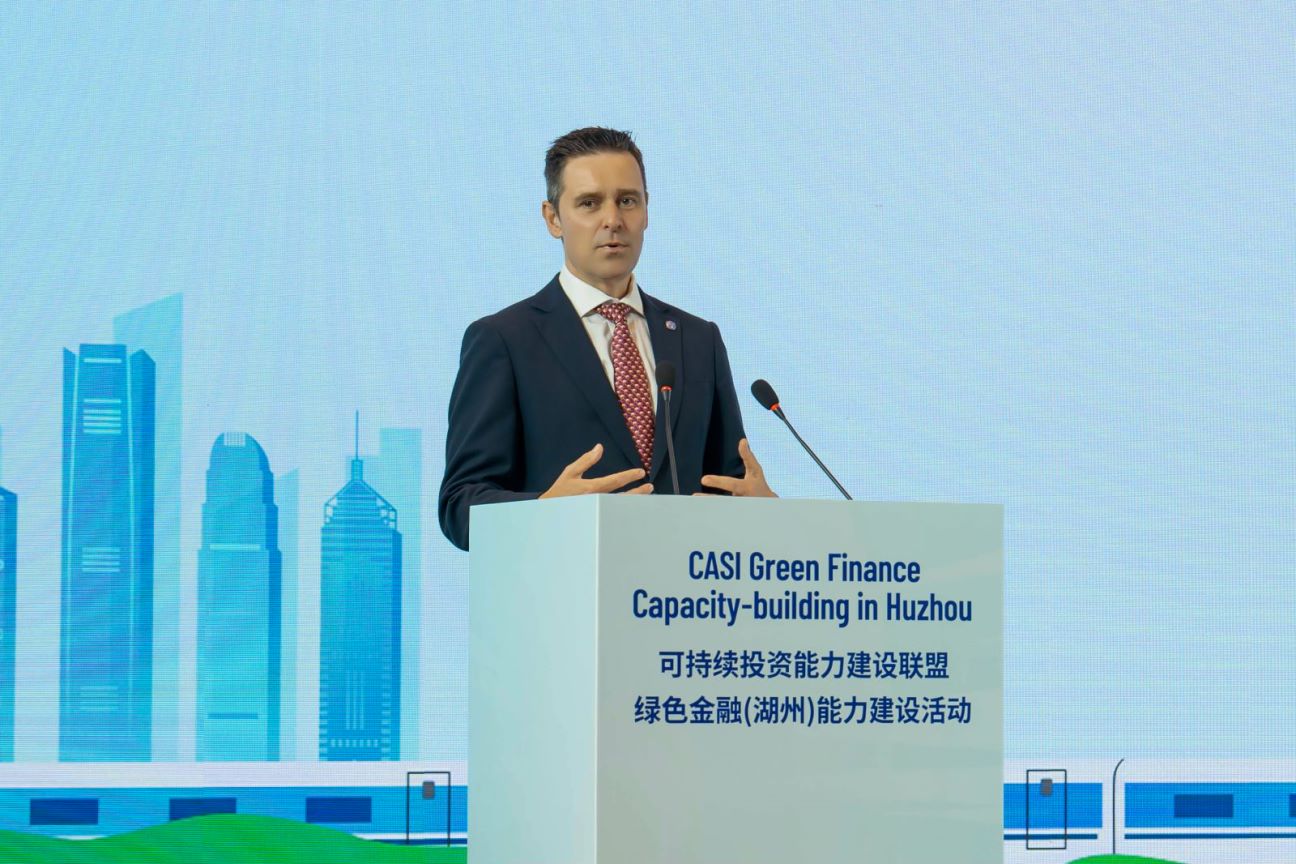
Paul Moody, Managing Director, Global Partnerships and Client Solutions, CFA Institute
Zhang Zhengwei affirmed the innovation and achievements of Huzhou City in the field of green finance, especially its pioneering exploration in sustainable information disclosure practices in line with ISSB standards. He pointed out that ISSB is working to integrate sustainability disclosure standards, reduce the reporting burden on companies, and enhance global acceptance through a series of measures, including unifying disclosure requirements for transition plans, optimizing greenhouse gas emission accounting standards, strengthening cooperation with international organizations, and focusing on global focal issues such as biodiversity and human capital. The ISSB Office in Beijing, targeting emerging economies, is committed to promoting the development of sustainability disclosure strategies among companies. ISSB looks forward to deepening cooperation with Huzhou to jointly promote higher-quality green finance innovation and sustainable information disclosure practices, contributing to global sustainable development.
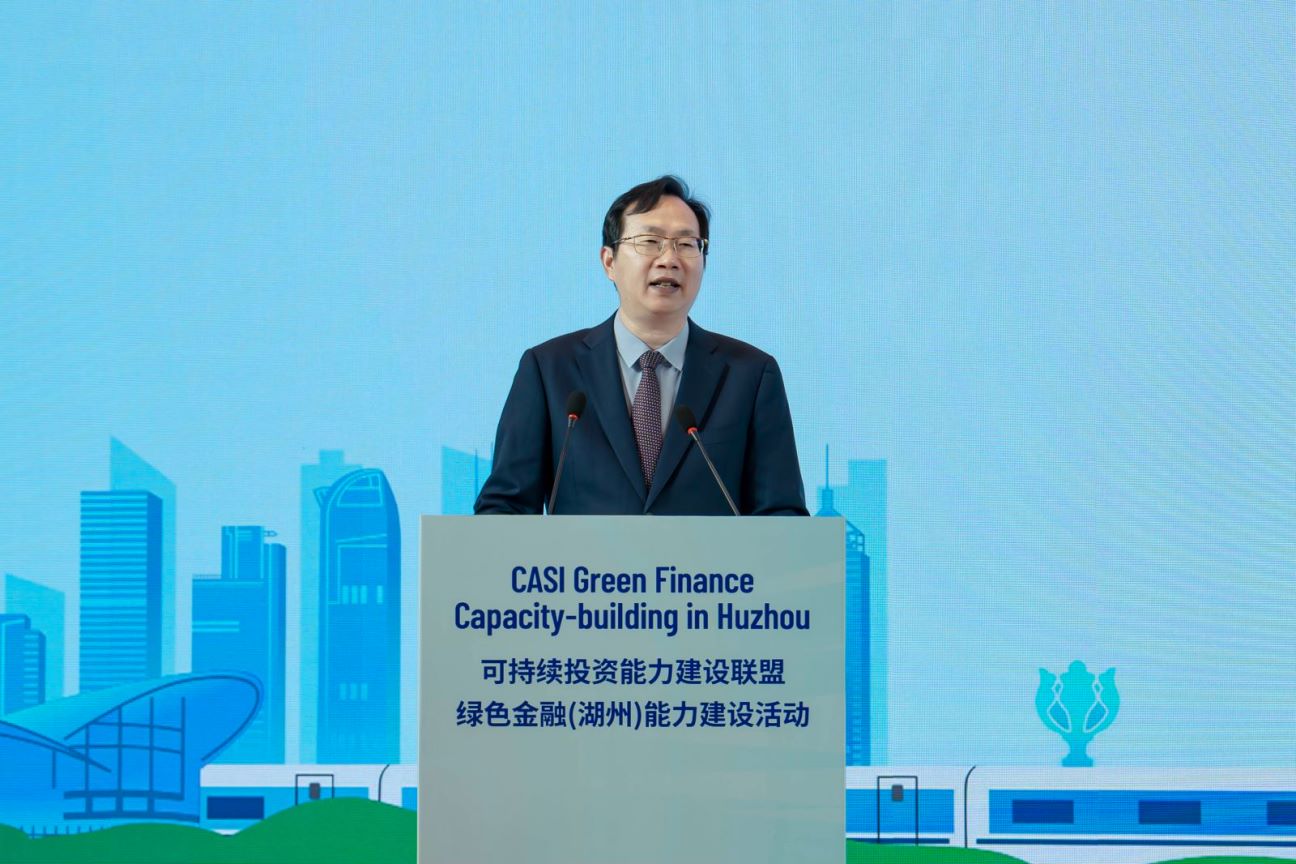
Zhang Zhengwei, Special Advisor to the ISSB Chair Emmanuel Faber and ISSB Beijing Office Director
Case Release
In the case release session, David von Eiff, Director of Global Industry Standards Research, CFA Institute analyzed the multiple reasons for the success of Huzhou's green finance reform from the perspective of an external observer. First, Huzhou has deeply studied the formation process of green finance policies and fully integrated local needs to customize localized strategies. He pointed out that the formulation of Huzhou's green finance policies is based on a profound understanding of the local economy, society, and environment, and is not a simple replication of foreign green finance models. Instead, it combines global sustainable development goals with China's specific context. This localized strategy is the foundation of the success of Huzhou's green finance reform. Second, Huzhou has vigorously promoted innovation during the green finance reform process, especially focusing on the application of financial technology in the development of green finance platforms. This not only improves the efficiency of information collection but also reduces the costs of carbon accounting and ESG rating. Third, Huzhou is able to design a diversified range of green finance products for different application scenarios, such as ESG insurance services and bamboo forest carbon sink projects. Fourth, at the policy level, Huzhou strives to achieve synergy between fiscal, monetary, and regulatory policies, and encourages individual sustainable behavior through incentive mechanisms at different levels. David emphasized that Huzhou's successful case not only demonstrates its leadership in the field of green finance but also reflects the key role of environmental regulations and capacity building in the financial sector and the real economy. He believed that Huzhou's practice can provide a reference for more regions and countries, especially in helping them to understand how to integrate green finance concepts into the local economic development process.

David von Eiff, Director of Global Industry Standards Research, CFA Institute
Practice sharing
In the practical sharing session, Liu Yiwen, Deputy Secretary-General of Huzhou Government, systematically introduced the reform and innovation work of Huzhou's green finance from the perspective of a policy maker. At the standardization level, Huzhou has issued multiple national, provincial and municipal standards, and developed an ESG evaluation model suitable for small and medium-sized enterprises in Huzhou, providing guidelines for different entities to participate in green finance reform. At the organizational level, Huzhou has promoted the establishment of green franchise standards by regulatory authorities, financial management departments, and financial institutions, and has encouraged financial institutions in Huzhou to carry out pilot programs. At the policy incentive level, Huzhou provides tiered incentives for financing entities to carry out green finance-related work through fiscal policies, monetary policies, and regulatory policies. Huzhou has formulated the Green Finance Promotion Regulations, planning to construct a comprehensive green finance promotion system in the form of local legislation. At the product innovation level, Huzhou has encouraged financial institutions to vigorously develop financial innovation products, including green credit, green bonds, green insurance, and green funds, with Huzhou's green credit ratio far exceeding the national average. In addition, Huzhou also actively applies financial technology to improve service efficiency and intelligent levels, and implements risk prevention and control mechanisms to effectively prevent financial risks.
Huzhou's green finance reform has been effective and fruitful. For instance, Anji Rural Commercial Bank has used "Ecological Restoration Loans" to support the "Deep Blue Plan", transforming abandoned mining pits into popular coffee shops, achieving the integrated development of ecological environment governance and green industries. The ESG-linked syndicated loan for a new energy battery company, led by the Bank of China Huzhou Branch, incentivizes the enterprise to enhance its green production capabilities. Liu Yiwen pointed out that Huzhou's green finance reform has not only driven local economic development and improved the regional ecological environment but also increased the overall quality of financial development, contributing solutions to the global development of green finance. Finally, he expressed his gratitude to all individuals and institutions that have supported the green finance reform in Huzhou, and looked forward to deepening cooperation with all parties in the future to jointly promote the development of green finance.
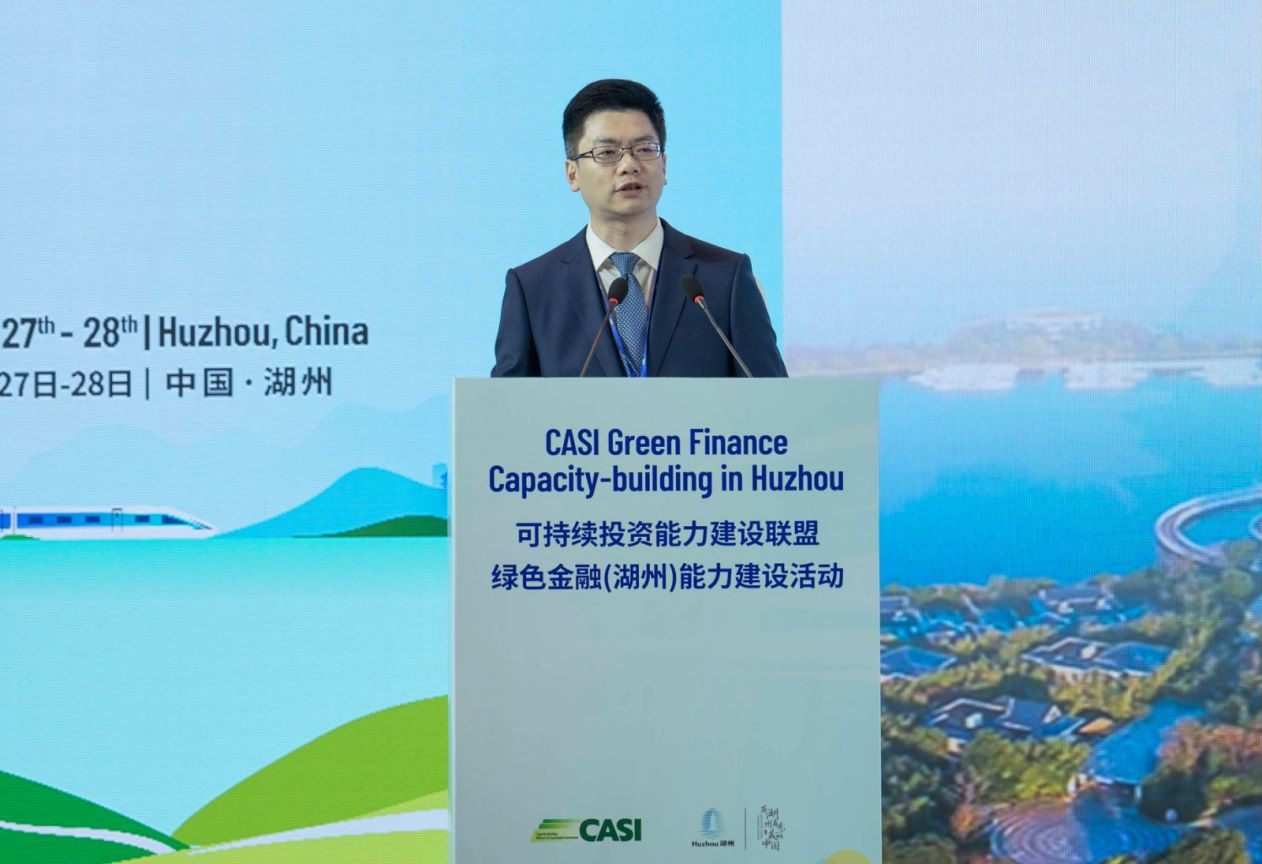
Liu Yiwen, Deputy Secretary-General of Huzhou Government
Special Session I: Local Practices in Transition Finance Reform
Huang Dingwei, Deputy Director of Huzhou Government Office, shared Huzhou's practical exploration of transition finance reforms, focusing on the five challenges encountered in implementing the G20 Transition Finance Framework. The first challenge Huzhou faced is how to accurately identify transition activities. To this end, Huzhou has formulated China's first Catalogue of Support Activity of Transition Finance, covering 106 low-carbon transition technology pathways in 9 major categories, 37 subsectors, which provides clear identification standards for transition activities, as well as corresponding systems and measures. The second challenge is setting ambitious transition targets to prevent "fake transitions". Huzhou has successfully guided enterprises to set transition targets aligned with the Paris Agreement and China's "3060" goals through the Huzhou Transition Target Planning Guide. The third challenge is the unclear elements and high costs that enterprises might face when formulating transition plans. Huzhou has provided a standardized template for transition entities through the "Huzhou Outline of the Transition Plan for Financing Entities" to clarify elements such as historical carbon emissions, transition targets, and financing needs, and help enterprises to develop high-quality transition plans. The fourth is that enterprises need to bear costs and risks during the transition process. Huzhou has introduced a transition loan subsidy policy, offering interest subsidies to enterprises that meet transition targets, while financial institutions provide customized financing service plans, such as higher credit limits and interest rate adjustment mechanisms linked to transition performance. The last challenge is that rapid transitions may bring certain social risks and affect the stable development of the regional economy. In promoting and assessing just transitions, Huzhou has formulated China's first just transition assessment methodology, which quantitatively assesses the impact of transition activities on employment, inflation, supply chain security, etc., and incorporates ESG into the assessment index system to promote the improvement of enterprises' ESG performance. In addition, Huang Dingwei also mentioned a number of innovative financial products related to transition finance, such as "Textile Transition Loans" and sustainability-liked bonds. To support the implementation of transition finance, Huzhou has further strengthened the construction of a digital carbon accounting platform, set up carbon accounts for enterprises. By publishing a list of transition enterprises, projects, and technologies on the platform, Huzhou has provided more than 30 billion yuan in credit support, effectively promoting the connection between the government, enterprises, and financial institutions.
Wu Di, Deputy Director of National Finance Regulatory Administration Huzhou Branch, shared the innovative practices and regulatory achievements of the financial regulatory branch in the field of green finance. This includes the establishment of the country's first green bank evaluation system and regulatory standards for green finance franchise systems, taking the lead in financial institutions' environmental information disclosure, and exploring the establishment of a carbon-neutral banking system. She pointed out that through the integration of industry and finance, the branch has supported the development of green manufacturing and construction industries, helping Huzhou achieve a win-win situation in economic and environmental benefits. By strengthening the green insurance system, the commission has improved the timeliness of policy support. She stated that the insurance industry has played an important role in risk reduction and has also had a positive impact on promoting the green transformation of enterprises.
Wen Yaoqi, Deputy President of ICBC Huzhou Branch, introduced the Measures for Assessing Just Transition of Financing Entities in Huzhou City formulated by ICBC in reference to the G20 Transition Finance Framework. This assessment method builds a framework from four aspects: assessment procedures, content, information disclosure, and result application, covering three dimensions of employees, supply chains, and sustainable development. It aims to promote enterprises to assess the social impact of transition activities and take measures to mitigate them. Currently, this method has been promoted in Huzhou City, where the government incorporates the assessment results into the fiscal subsidy management, and banks differentiate credit policies based on the assessment results. He emphasized that this move not only strengthens the transition finance system in Huzhou City but also enhances the bank's own ESG construction.
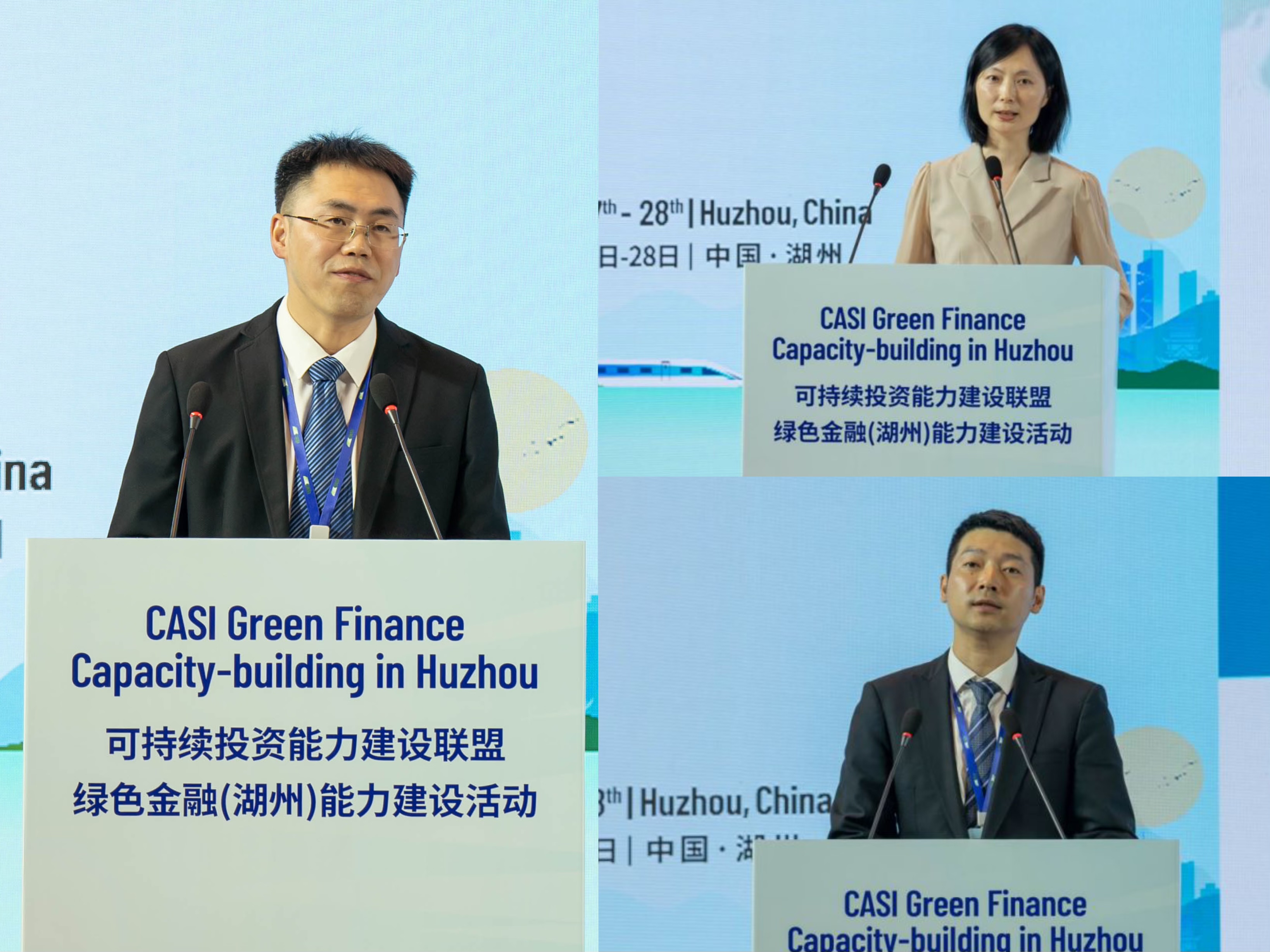
Left: Huang Dingwei, Deputy Director of Huzhou Government Office
Top Right: Wu Di, Deputy Director of National Finance Regulatory Administration Huzhou Branch
Bottom Right: Wen Yaoqi, Deputy President of ICBC Huzhou Branch
Special Session II: Fintech Boosting Green Finance Reform and Innovation
The introduction by Guo Zhengjiang, Deputy Manager of the Huzhou Branch of the People's Bank of China, focused on the "Green Finance Information Management System." This system integrates real-time collection, processing, analysis, and application of green loan data, encompassing core functions such as performance evaluation, information disclosure, information sharing, and policy support. He pointed out that the system's innovation is mainly reflected in five aspects: First, it achieves "T+1" data collection and improves the accuracy of data reporting; Second, it supports the identification and certification of green standards and carbon accounting tools, and enhances the scientific measurement of environmental benefits; Third, it supports the pledge of green credit assets and the evaluation of green finance, and provides incentive policies; Fourth, it supports environmental information disclosure and star-rating of financial institutions; Fifth, it sets up special monitoring functions to promote precise connection between green industries and finance. Guo Zhengjiang stated that the system has been highly evaluated by the PBOC headquarters and relevant national ministries and commissions. In the future, the system will optimize its functions, expand application scenarios, promote the interconnection of green finance-related platforms, support the development of new green finance businesses, and build a performance monitoring and evaluation mechanism for transition finance.
Lv Fan, Director of Financial Reform Department of Huzhou Municipal Government Office, introduced Huzhou's ESG evaluation system. Based on three-dimensional indicators of environmental impact, social responsibility, and corporate governance, this system is the first regional ESG evaluation system in the country, aiming to promote green finance to support the sustainable development of small and medium-sized enterprises. The system incorporates carbon emissions into the evaluation system, comprehensively evaluates corporate carbon emissions through "carbon efficiency code" and "carbon account", and forms carbon labels to measure the carbon emission performance of enterprises. In addition, the evaluation system also introduces a green insurance mechanism and the evaluation index of “Acreage Benefit Evaluation” to more comprehensively evaluate the sustainable development capabilities of enterprises. Lv Fan stated that the development of the digital system is a highlight of Huzhou's ESG evaluation. Relying on the Huzhou Integrated Intelligent Public Data Platform, the system has achieved 100% automated evaluation, and currently, 22,000 enterprises have been scored, effectively enhancing the green orientation of financial services and market incentive mechanisms. Lv Fan pointed out that the Huzhou ESG evaluation system has achieved two important shifts: First, it has realized the prior guidance of green financial services, allowing bank customer managers to track the green performance of enterprises through the ESG system throughout the entire loan process; Second, the application of evaluation results has shifted from policy incentives to a coordinated incentive mechanism involving both the government and the market, encouraging financial institutions to apply ESG evaluation results in product innovation, risk management, and other aspects, promoting the value realization of ESG evaluation results.
Xu Yineng, General Manager of Huzhou Green Finance Development Center Co., Ltd., introduced the "Green Loan Connect" platform in Huzhou. Relying on a big data resource system and the ESG evaluation model, the platform integrates resources from 36 banks and over 500 branches, offering more than 400 credit products. It enables enterprises to quickly post financing applications through online registration and certification, with timely responses from over 3,200 customer managers. Xu Yineng stated that the platform has currently provided policy subsidies for more than 2,400 enterprises and facilitated bank credit for 43,000 enterprises exceeding 530 billion yuan, driving the proportion of green loans to reach 33.7% of total loans, ranking first in Zhejiang Province.
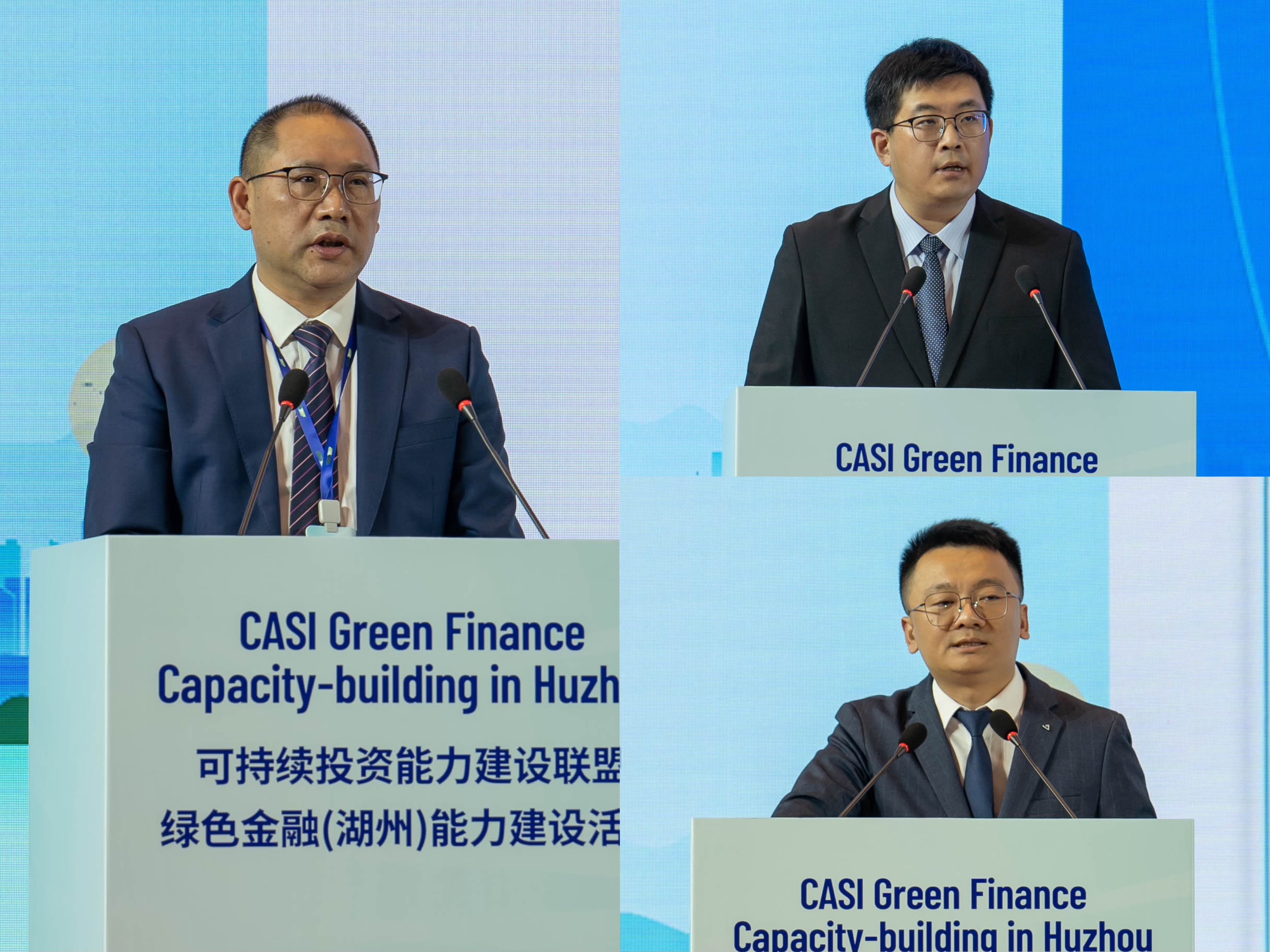
Left: Guo Zhengjiang, Deputy Manager of the Huzhou Branch of the People's Bank of China
Top Right: Lv Fan, Director of Financial Reform Department of Huzhou Municipal Government Office
Bottom Right: Xu Yineng, General Manager of Huzhou Green Finance Development Center Co., Ltd.
Special Session III: Green Finance Innovation by Financial Institutions
Fang Xiaying, General Manager of Green Finance Department of Huzhou Bank, elaborated on the green finance innovation practices of Huzhou Bank from four aspects. First is establishing a green development strategy and integrating green concepts into the core of business operations; second is innovating financial products, such as launching low-carbon growth loans and green small and micro enterprise express loans to support the low-carbon transformation of enterprises and the green development of small and micro enterprises; third is risk management, utilizing intelligent systems to enhance credit management efficiency, introducing the ESG indicator system, and optimizing carbon accounting of credit assets; fourth is promoting the integrated development of green finance and international business, including introducing international green funds, issuing green bonds, and supporting carbon reduction projects.
Mei Yunfei, Deputy President of Anji Rural Commercial Bank, introduced the bank's progress in the integration of green finance and inclusive finance. The bank has established a full-process management mechanism for green credit and formulated implementation standards for green credit. In terms of product innovation, the bank has launched six major series of credit products, including green recycling and green energy, and also supports the transformation and restoration of waste resources through financial products such as "Ecological Restoration Loans." He also introduced the bank's creation of the green credit system and the "Two Mountains Green Coins" points system, which are designed to encourage residents to practice green lifestyles. In the construction of a "carbon-neutral" bank, the bank has not only formulated a detailed roadmap and standards but also established pilot "carbon-neutral" branches and published a white paper. In addition, the bank collects carbon emission data from enterprises and develops carbon financial products to promote the green transformation of enterprises. Mei Yunfei stated that the bank will continue to optimize the green inclusive finance product service system, accelerate the development of transition finance, and contribute to the country's "dual carbon" goals.
Mei Yunhai, Deputy President of Deqing Rural Commercial Bank, introduced the bank's work related to the protection of biodiversity. Combined with the "Technical Specification for Effectiveness Assessment of Biodiversity Conservation for Ecological Projects," the bank provides credit funds to ecologically friendly enterprises and innovatively launches a wetland carbon sink finance "PTD" closed-loop system and a variety of green credit products to form a comprehensive service system. These measures not only support wetland ecological restoration and biodiversity protection but also promote the green transformation of surrounding industries and the green lifestyle of residents. Mei Yunhai stated that in the future, the bank plans to further contribute to biodiversity protection and sustainable development by establishing nature-related financial standards, participating in biodiversity information disclosure, and innovating service models for biodiversity.
Xiang Fei, Deputy General Manager of People's Insurance Company of China (PICC) Huzhou Branch, focused on PICC's exploration and practice in designing and promoting ESG insurance. This insurance provides comprehensive insurance solutions for enterprises through risk assessments in three dimensions of environmental, social, and governance. The main practices of this insurance include conceptual research, the "four ones" strategy at the operational level, which includes package insurance coverage, integrated risk assessment, one-stop comprehensive services, reduce cost and increase efficiency, and a progressive implementation path. Xiang Fei stated that ESG insurance can effectively reduce corporate premium costs and enhance risk management capabilities. And it has been applied in multiple industries, providing more than 3.6 billion yuan in risk protection. Xiang Fei emphasized the promotional value of ESG insurance, including wide coverage of protection, scalable insurance protection content, linkage between assessment and rates, and scalable extension of functional effects.
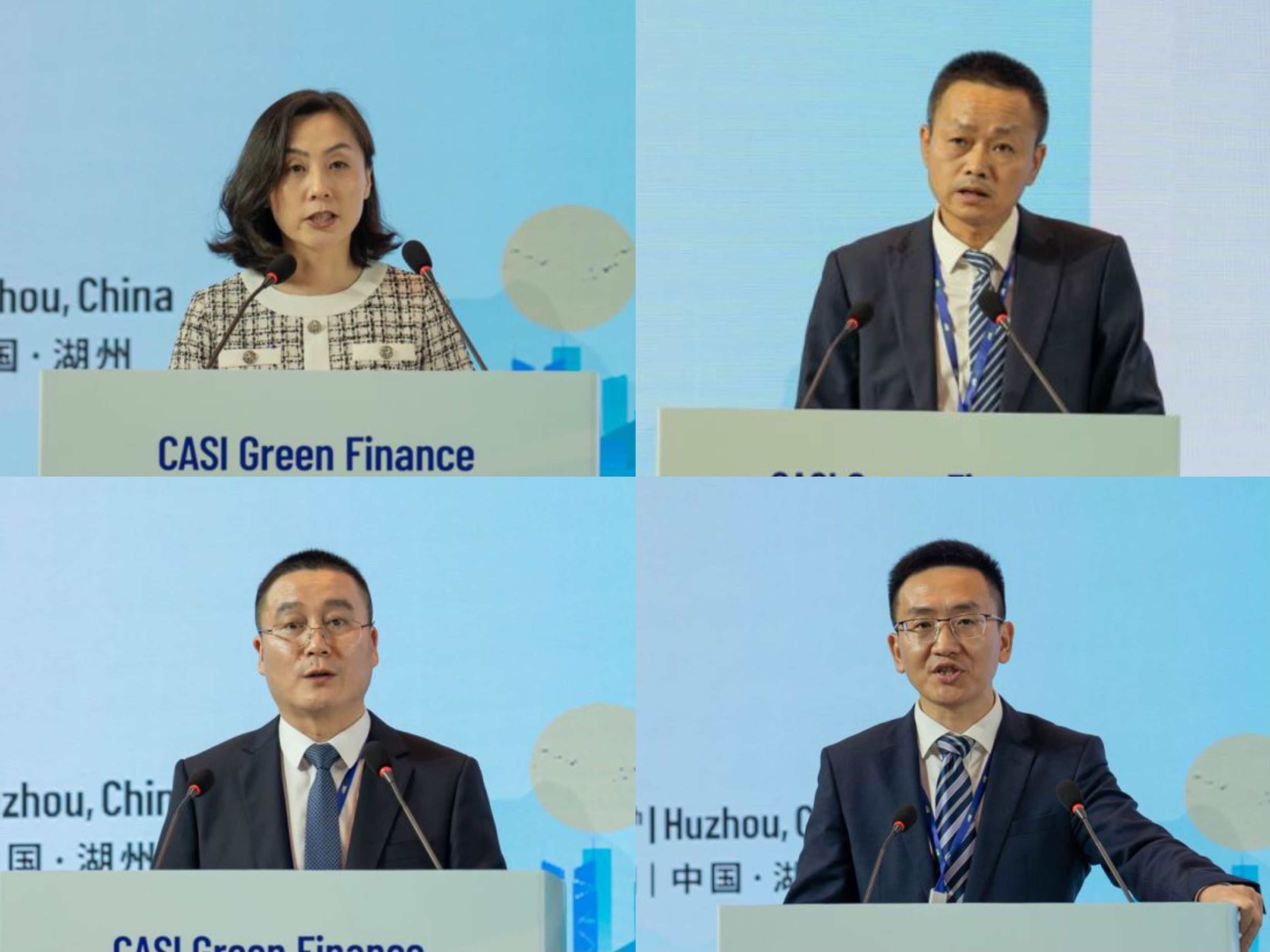
Top Left: Fang Xiaying, General Manager of the Green Finance Department of Huzhou Bank
Top Right: Mei Yunfei, Deputy President of Anji Rural Commercial Bank
Bottom Left: Mei Yunhai, Deputy President of Deqing Rural Commercial Bank
Bottom Right: Xiang Fei, Deputy General Manager of People's Insurance Company of China (PICC) Huzhou Branch
At the end of this conference, Ma Jun, Chairman of CASI and President of the IFS, summarized the speeches of the guests. He elaborated on the seven typical issues faced by emerging markets in developing green finance and proposed corresponding solutions from Huzhou. First, in response to the problem of poor inter-institutional coordination, Huzhou has ensured the collaborative advancement of green finance development through legislation. Second, in response to the lack of specific operational guidance for financial institutions, Huzhou has formulated a series of detailed guidelines, such as Catalogue of Support Activity of Transition Finance and ESG evaluation methods. Third, in response to the confusion of banks and enterprises in formulating transition plans, Huzhou has provided draft templates for transition financing. Fourth, in response to the issue of high ESG rating costs, Huzhou has significantly reduced the costs by establishing a digital platform. Fifth, in response to the lack of motivation for banks and enterprises to participate, Huzhou has effectively stimulated the enthusiasm of market entities through subsidies and incentive measures. Sixth, in response to the insufficient capacity in government agencies, Huzhou has effectively enhanced its professional capabilities by integrating other departments' strengths and seconding professional talents. Seventh, in response to the difficulties in team building for financial institutions, Huzhou has successfully built a professional green finance team through internal incentive measures and professional training. Ma Jun emphasized that through the CASI platform, developing countries and emerging markets can further strengthen exchanges and cooperation in the field of green finance. Finally, he expressed his gratitude to the Huzhou Municipal Government and the CASI team for their contributions and looked forward to their continued efforts in future activities.


